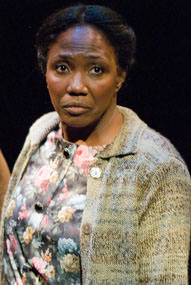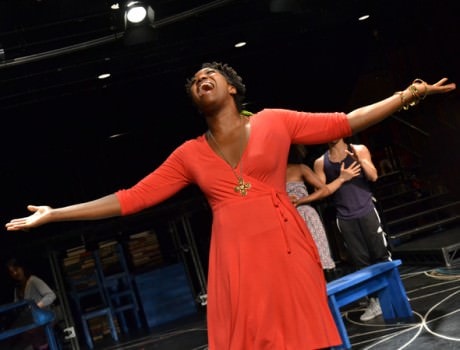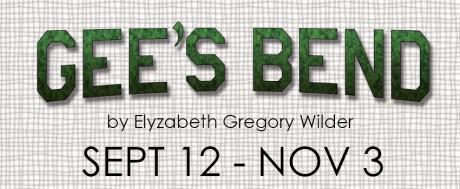She’s been involved with Gee’s Bend since its first reading and now Margo Moorer will be reprising the role of Nella in MetroStage’s new production of Gee’s Bend, which opens on September 12th. Margo takes us back to that first reading and a visit to meet the women of Gees Bend before the first production in Alabama, and introduces us to her cast mates at MetroStage.
Joel: When and how did you first get involved in Gee’s Bend? When and how did you first get involved in Gee’s Bend?

Margo: I was cast for the reading at the Southern Writer’s Project at Alabama Shakespeare Festival in 2006.
What do you remember about the first reading of Gee’s Bend and what was it about that experience that made you say, “This is a special play and I want to be a part of it?”
During the rehearsal process the words fit in my mouth; my spirit and I could genuinely relate to the women of Gee’s Bend. I felt like I knew them. Some of the core group of quilter’s headed by Mary Lee Bendolph attended the reading. At the end of the reading they stood up, Mrs. Bendolph rushed the stage with her hands raised to the heavens, saying, “Excellent!” “Excellent!” The audience and cast were in tears. Everybody was on their feet. It was overwhelming. The mandatory critique session following every reading was obliterated and the show was booked immediately for the 2007 season. I needed to be a part of whatever was going to help tell the story of these women.
You stated that you made Elyzabeth Gregory Wilder “an honorary black girl” for handling the truth of the language and the root essence of the women. What ‘truths of the language’ and ‘root essence’ of women did Elyzabeth reveal in Gee’s Bend that audiences in 2013 – men and women – of all races and genders can, will, and should relate to.
Prior to meeting Elyzabeth, I felt the writing rang true to my people and I believed an African-American had written the play. Upon meeting her I had to make her “an honorary black girl,” since she’d captured the dialect, the life, the spirit of a people foreign to her culture. The playwright had been granted the opportunity to sit at the feet of these women and hear first hand from their hearts about who they were, and having done so, audiences of every generation will be able to relate to the universal theme of this story. A people who continue to triumph through adversity.
Now that you are in the DC area performing the play – does Gee’s Bend hold any extra special meaning as Martin Luther King Jr.’s March on Washington in 1963 has celebrated its 50th Anniversary in DC this week?
1963/2013 The struggle for poor people continues on so many levels. Gee’s Bend is one community of many where this time of heightened interest begs us to give attention. Ironically, in the 60s Gee’s Bend wanted to change their name to ‘King’ in honor of Dr. King’s visit to their town. His presence had changed their course of history for better and for worse simultaneously. It brought attention to their struggle and cut them off from the rest of the world. The wagon that carried his remains in his funeral procession was from Gee’s Bend. Gee’s Bend being performed at this time in history in the DC area brings attention to how far we have come, and how far we have to go as a people.
Tell us about the character you are playing and how you relate to her. What personal experiences helped you shape your performance, and have your feelings or opinion or your performance of this character changed since you first performed the role at The Alabama Shakespeare Festival in 2007? What is the best advice Director Thomas Jones III has given you on playing Nella?

I play the character Nella, older sister to the heroine of the story. This character is a compilation of several women in Gee’s Bend. Nella is a complexity of fear: very much unlike me and foreign to most characters I get to embody. My life experiences with the tenacity of the matriarchs of my own family helped to shape my performance in 2007, and continues to inform me in 2013. I feel like I’ve been cut from the same cloth as these women. Meeting one of the quilters while in Gee’s Bend I decided I liked her spirit and would base this character on her. Much too my surprise at the opening night party at ASF, she said to me, “You played me real good up there.” I’m still floored by how she would know that after I’d only spent roughly three short hours in her presence. In rehearsals, presently, I see nuances that were not in the earlier performance, and with Tom Jones I’m seeing a male perspective as we learn from each other about where we’re headed in this production.
You visited Lowndes County, Alabama, where the women of Gee’s Bend lived and where Dr. King visited the night before his March on Selma. What were some of your fondest memories of that visit? What did you learn about these women that you didn’t know before you made that visit that helped to bond you and other members of the cast, and also made you respect the women of Gee’s Bend even more?
I remember their hospitality and their love of God. These women know God. They love Jesus. I didn’t know about how they walk hand in hand with the Lord. They talk about the Lord easier than they talked about themselves. I knew very little about the faith of the Women of Gee’s Bend prior to my visit. They were boldly humble women. The sense of family and ownership were apparent. I remember that they were grateful for our visit and were relieved that we were not there for them to perform. I was amazed that the money they make on the templates and quilts had not changed how they live. I was awe struck by the amount of land and saddened by the fact that there is no Fire Department on their property, and the fact that if a house caught fire they’d have to watch it burn to the ground. It gave me joy to learn that there were no obstacles they could not overcome. I was disturbed we had to receive permission to visit them. I was blessed being in their presence and comforted by the bond we made. We all laughed,ate,sang, cried, and prayed together. I have high regard for these women.
Why is storytelling so important and how do the quilts and the songs of Gee’s Bend tell the story of these women, their quilts, and the times and injustices they had to endure?
The history of a people is embedded in the stories they tell. The history of Gee’s Bend are in the quilts and the songs they sing. They are one and the same. The Women of Gee’s Bend are living history. The quilts are truly the fabric of their lives.

Photo by David Gordon.
Your daughter Amber Iman, who wowed MetroStage audiences when she performed in The Stephen Schwartz Project, just made her Broadway debut as Nina Simone in Soul Doctor. What advice did you give her when she came to you and told you she wanted to make theatre and/or acting her career? And has she followed that advice?
Amber declared at the age of nine she was going to be an actress. I think I was the most surprised that she, being quite shy, would want to follow in my footsteps. Naturally, I preferred she chose a profession where she’d be wealthy, but she insisted. So since she was also a very bright child and an excellent student, I gave in. I found it difficult to not allow her to fulfill her passion as my Mother encouraged me to do whatever I wanted to do. She literally grew up in the theatre watching me, so being a very much hands on Mother I saw that she was given every opportunity to hone her craft through summer theatre programs, ballet, piano, choirs, television, and every performance related endeavor. She was very active in church, Girl Scouting, school, and anywhere else I thought she needed to become a well-rounded person. I even selected Howard University as the place to prepare her for the world she was about to face. My advice to her in all things is to work hard: Give 150 percent on stage or choose another profession. Apparently it has paid off!!
Please introduce us to your cast mates and tell us what you admire most about their performances.
I’ve worked with Roz White (Sadie) in the past and believe we’re actually related. Both Roz White and Anthony Manough (Macon) worked with Amber in Fool For Love, by Tom Jones three days before she booked Soul Doctor. They were off the chain! I need to see Tom Jones, Roz, and Anthony on Broadway in the very near future. I’m working with Duyen Washington for the first time. I love her. I absolutely love these people, and we are real close family already. I admire the gifts of each of them – particularly the Williams – Knowles and Hubbard – our music directors. There are no words for what they do. Tom Jones and I share the same birthday and we are just crazy people together. I’ve known him almost 30 years and he’s like good wine. This is our second together this year. Somebody needs to open a door for him. This is going to be a phenomenal work. Make no mistake about it We give 150%.
What do you want audiences to take with them after seeing Gee’s Bend at MetroStage?
WOW!
Gee’s Bend plays from September 12-November 3, 2013 at MetroStage – 1201 North Royal Street, in Alexandria, VA. For tickets, call the box office at (703) 548-9044, or purchase them online.
LINKS





